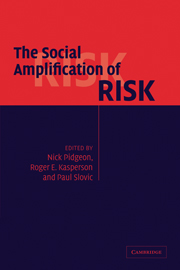Crossref Citations
This Book has been
cited by the following publications. This list is generated based on data provided by Crossref.
Walls, John
Pidgeon, Nick
Weyman, Andrew
and
Horlick-Jones, Tom
2004.
Critical trust: understanding lay perceptions of health and safety risk regulation.
Health, Risk & Society,
Vol. 6,
Issue. 2,
p.
133.
Elms, D G
2004.
Structural safety–issues and progress.
Progress in Structural Engineering and Materials,
Vol. 6,
Issue. 2,
p.
116.
Pidgeon, Nick
and
Gregory, Robin
2004.
Blackwell Handbook of Judgment and Decision Making.
p.
604.
Rothstein, Henry F.
2004.
Precautionary Bans or Sacrificial Lambs? Participative Risk Regulation and the Reform of the UK Food Safety Regime.
Public Administration,
Vol. 82,
Issue. 4,
p.
857.
Vasterman, Peter
Yzermans, C. Joris
and
Dirkzwager, Anja J. E.
2005.
The Role of the Media and Media Hypes in the Aftermath of Disasters.
Epidemiologic Reviews,
Vol. 27,
Issue. 1,
p.
107.
Sunstein, Cass R.
2005.
Irreversible and Catastrophic.
SSRN Electronic Journal ,
Nash, Victoria
and
Peltu, Malcolm
2005.
Rethinking Safety and Security in a Networked World: Reducing Harm by Increasing Cooperation.
SSRN Electronic Journal,
Sunstein, Cass R.
2005.
The Availability Heuristic, Intuitive Cost-Benefit Analysis, and Climate Change.
SSRN Electronic Journal,
Bakir, Vian
2005.
Greenpeace v. Shell: media exploitation and the Social Amplification of Risk Framework (SARF).
Journal of Risk Research,
Vol. 8,
Issue. 7-8,
p.
679.
Davis, Jeffrey Sasha
2005.
“Is It Really Safe? That's What We Want to Know”: Science, Stories, and Dangerous Places.
The Professional Geographer,
Vol. 57,
Issue. 2,
p.
213.
Poumadère, Marc
Mays, Claire
Le Mer, Sophie
and
Blong, Russell
2005.
The 2003 Heat Wave in France: Dangerous Climate Change Here and Now.
Risk Analysis,
Vol. 25,
Issue. 6,
p.
1483.
Lorenzoni, Irene
Pidgeon, Nick F.
and
O'Connor, Robert E.
2005.
Dangerous Climate Change: The Role for Risk Research.
Risk Analysis,
Vol. 25,
Issue. 6,
p.
1387.
Horlick-Jones, Tom
2005.
On ‘risk work’: Professional discourse, accountability, and everyday action.
Health, Risk & Society,
Vol. 7,
Issue. 3,
p.
293.
Lima, Maria Luisa
Barnett, Julie
and
Vala, Jorge
2005.
Risk Perception and Technological Development at a Societal Level.
Risk Analysis,
Vol. 25,
Issue. 5,
p.
1229.
Hutter, Bridget
and
Power, Michael
2005.
Organizational Encounters with Risk.
Lorenzoni, Irene
and
Pidgeon, Nick F.
2006.
Public Views on Climate Change: European and USA Perspectives.
Climatic Change,
Vol. 77,
Issue. 1-2,
p.
73.
Palfreman, Jon
2006.
A Tale of Two Fears: Exploring Media Depictions of Nuclear Power and Global Warming.
Review of Policy Research,
Vol. 23,
Issue. 1,
p.
23.
Jackson, Jonathan
2006.
Introducing Fear of Crime to Risk Research.
Risk Analysis,
Vol. 26,
Issue. 1,
p.
253.
Shaw, Rajib
and
Ichinosawa, Jumpei
2006.
Reputational disaster in Phuket: the secondary impact of the tsunami on inbound tourism.
Disaster Prevention and Management: An International Journal,
Vol. 15,
Issue. 1,
p.
111.
Gibson, Steve
2006.
Evaluating Intelligence as a Public Contrition.
International Journal of Intelligence and CounterIntelligence,
Vol. 19,
Issue. 1,
p.
189.





